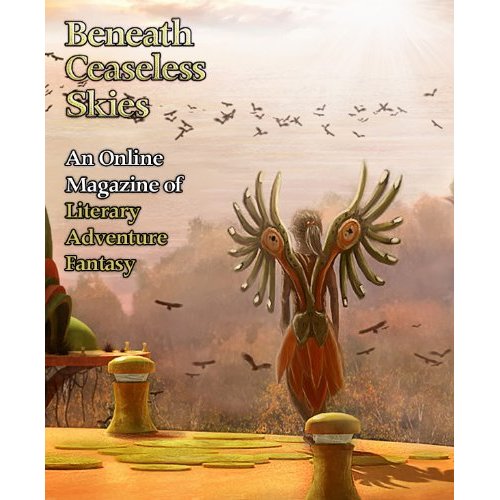 Beneath Ceaseless Skies #70 and #71 — June 2011
Beneath Ceaseless Skies #70 and #71 — June 2011
“From the Spices of Sanadira” by Bradley P. Beaulieu (Part 1 in #70, Part 2 in #71)
“The Nine Tailed Cat” by Michael J. DeLuca (#70)
“The Godslayer’s Wife” by Therese Arkenberg (#71)
Reviewed by Joseph Giddings
Bradley P. Beaulieu’s “From the Spices of Sanadira” was published in two parts and is reviewed here in its entirety. In this story, we come in with three people on the run from what seems to be some sort of spirit of the desert, like a Jinn, called an ehrekh. At first we wonder why they are fleeing from these monsters, and why the king of this land of shifting sand dunes is after them with such vehemence. Was he sending the ehrekh after them? Are they after the spice on board the ship, or do they seek something else. Or someone else?
Despite its length, it’s fairly clear from the beginning what is happening in the story, and why the characters are on the run. One of their number uses the “King’s Spice,” fyndrenna, to allow him to see into the past, to see how a previous captain managed to escape the wrath of the ehrekh, and in turn, how the little boy that is with them managed to escape. What you do not see coming, however, is how they resolve the issue at the end, and how the future of an entire kingdom is put up for readjustment.
I felt the story was a bit long, despite it being interesting. Could it be chopped down some to make it more friendly to a reader while at the same time retaining its charm and intensity? I don’t think so, but I did find myself wishing on several occasions that the pace would pick up, or that something would be revealed to me. But this is not a deterrent to reading it, as the tale is a well written one.
“The Nine Tailed Cat” by Michael J. DeLuca is a classic tale of avarice and infidelity, but told in such a way that at first you don’t notice it. A man has taken a jewel from a dead animal and presented it to the woman he loves in order to win her heart, and he does so, but eventually his desire for the jewel from another animal drives him after the creature, and in turn, ruins everything he has.
Not a happy tale by any stretch, within this story we learn that desiring more than we have could have terrible consequences if we decide to act on all of our impulses. While wanting better can lead to a richer, and fuller, life, trying to obtain everything we want can be dangerous. Theft can lead to lies, and lies to murder.
A quick read, and recommended to everyone.
How are gods made? How do you repent when you’ve killed one? These questions and more come from Therese Arkenberg‘s “The Godslayer’s Wife.” A hero, who killed the goddess of dust and death, won his wife when he rescued her from the dark and lifeless place that was the goddess’ home. However, the goddess, before slaying him, told him how he and his prize would die. He is haunted with this knowledge, and suffers greatly with nightmares. Despite his heroic actions, he feels regret for having done such a deed.
However, salvation comes in the form of the woman’s sister, also with her at the goddess’ home, long ago. She tells of a place that may heal him, and in turn, it may heal her.
The story is very philosophical, exploring life, death, birth, regret, and redemption for one’s deeds. At first it didn’t hold my attention very well, but became very engrossing toward the end, especially once the hero reveals how they are to die. Of course, the goddess’ vision wasn’t entirely accurate, and shows us that the telling of the future will not give us all of the information, and that we shouldn’t live our lives according to that knowledge, as no one can predict, with any accuracy, their own fate.